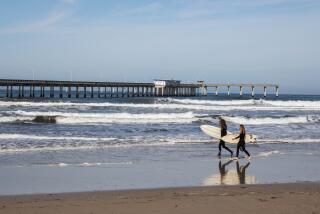Pier Accident Suit Falls Flat on Its Face
After deliberating three hours, a Ventura County jury on Thursday rejected convicted perjurer Jerry Fraschilla’s lawsuit seeking $90,000 as compensation for tripping and falling over a warped piece of wood on the Ventura Pier.
Attorneys for the city and one of its contractors told jurors in closing arguments Thursday that Fraschilla was either a con man who faked the accident or a klutz who should have watched where he was going.
Either way, they argued, he didn’t deserve a dime.
“I think if you put this case on a scale,” attorney Terrence J. Bonham said during his summation, “it weighs nothing.” Fraschilla, a 61-year-old Oxnard resident, sued the city and its contractor last fall, claiming he suffered a severe back injury while jogging on the pier in March 1997. He said he tripped over a thin piece of wood protruding from the deck and needs at least $37,000 for back surgery.
During his 4 1/2-day trial, Fraschilla and his girlfriend, former Mouseketeer Darlene Gillespie, took the stand to describe the incident and long-term injuries they say he suffered.
Gillespie, an original member of 1950s television show “The Mickey Mouse Club,” testified that her “sweetheart” can’t jog anymore, has trouble sitting for long periods of time, and occasionally needs shots of pain medication.
But defense attorneys countered that Fraschilla has a history of back problems--not to mention a criminal record for lying under oath in a securities fraud case currently in federal court.
In that case, Gillespie and Fraschilla were both charged with a fraudulent stock-buying practice known as “free riding,” in which they allegedly violated federal securities laws by buying stock in 1992 and 1993 without means or intention of paying for it.
Fraschilla pleaded guilty to charges stemming from his role in the alleged scheme, and Gillespie is scheduled for trial later this month.
“We don’t need to beat on the fact that Mr. Fraschilla is a convicted perjurer,” said attorney Gerald B. Malanga, who is representing the contractor in the case.
But he reminded the jury that Fraschilla also pleaded guilty to 20 other counts, including perjury, obstruction of justice and fraud. Those admissions cast doubt on the validity of Fraschilla’s current claims, Malanga said.
“I personally do not believe this accident occurred,” Malanga argued. “This sounds like a scheme.”
Fraschilla, who is scheduled to be sentenced Monday in U.S. District Court for the fraud case, left the courtroom with Gillespie at his side before defense attorneys gave their final summations.
But earlier, when his own attorney Michael S. Duberchin addressed the jurors, Fraschilla, an ex-Marine, sat in his chair, draped with a bright red jacket with military patches, and turned to face the panel.
For more than an hour, Duberchin told the jury the evidence in the case clearly showed long, thin wedge-shaped wooden planks known as “shims” were dangerously sticking up from the pier. When one tripped his client, he said, that constituted negligence on the part of the city and the contractor it hired to install the shims.
Furthermore, he argued, medical experts testified that Fraschilla’s back problems worsened after the fall. And the plaintiff described his own condition during the trial.
“Jerry told you about his feelings, about the constancy of the pain, and he tried to explain what the pain feels like,” Duberchin said. “You either believe him, or you don’t.”
Duberchin concluded by telling jurors that he is not asking for a million-dollar judgment, but a “reasonable” sum to compensate for his client’s medical needs and suffering.
“I proved Jerry Fraschilla’s case,” Duberchin declared. “You don’t like him. You don’t like what he has done. You don’t like what he has pled to--it doesn’t matter. There is a legitimate right to compensate for those injuries.”
Bonham said that is not the case here, however.
In his closing statement, the Oxnard lawyer said city maintenance crews never noticed a problem with the planks Fraschilla claimed were poking up from the deck. He suggested that Fraschilla tripped because he was not watching where he was going, which would not constitute negligence for the city.
Bonham also rejected the plaintiff’s arguments that there should have been warning signs at the entrance of the pier.
“This comes down to a matter of personal responsibility,” he said. “Look where you are going.”
More to Read
Sign up for Essential California
The most important California stories and recommendations in your inbox every morning.
You may occasionally receive promotional content from the Los Angeles Times.









